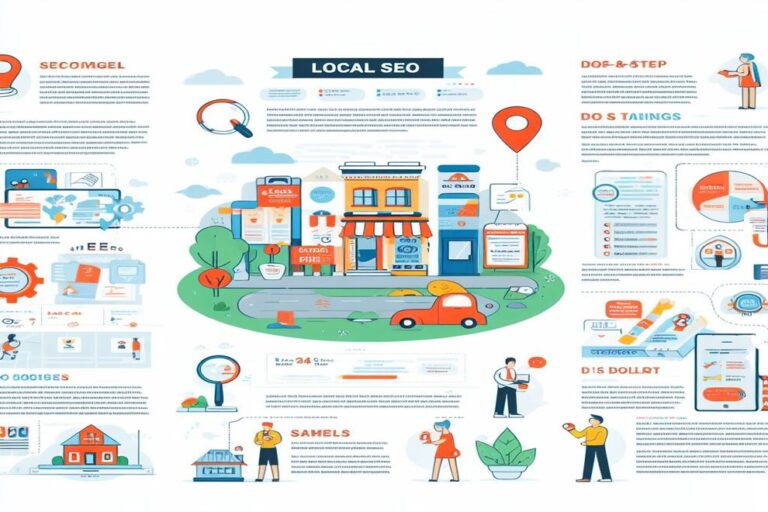Scaling Your Small Business with Digital Marketing Strategies

In today’s digital age, scaling a small business is closely intertwined with effective digital marketing strategies. Leveraging the power of the internet, small businesses can compete with larger corporations and reach a global audience. In this comprehensive guide, we will explore the importance of digital marketing for small businesses, the challenges they face, and actionable strategies to help you scale your small business successfully.
The Significance of Digital Marketing for Small Businesses
Why Is Digital Marketing Important?
Digital marketing is crucial for small businesses for several reasons:
- Cost-Efficiency: Digital marketing often costs less than traditional advertising methods, making it accessible for small businesses with limited budgets.
- Global Reach: Through digital channels, small businesses can reach a global audience, expanding their customer base far beyond their local area.
- Targeted Marketing: Digital marketing allows businesses to precisely target their ideal customers, ensuring that marketing efforts are more effective.
- Data-Driven Insights: Digital marketing provides data and analytics that help small businesses understand their audience, measure performance, and adjust strategies accordingly.
- Competitive Edge: Effective digital marketing can level the playing field, allowing small businesses to compete with larger corporations in the online arena.
Challenges Faced by Small Businesses
Small businesses encounter unique challenges in the digital marketing landscape:
- Limited Resources: Small businesses may have limited budgets and personnel for digital marketing efforts.
- Competition: Small businesses often face intense competition online, requiring them to stand out in a crowded marketplace.
- Technological Adaptation: Adapting to new digital marketing technologies and trends can be challenging for small businesses.
- Time Constraints: Managing digital marketing in addition to daily operations can be time-consuming.
Strategies for Scaling Your Small Business with Digital Marketing
To effectively scale your small business with digital marketing, consider implementing these strategies:
1. Content Marketing
Content marketing involves creating and sharing valuable, relevant content to attract and engage your target audience. This can include blog posts, videos, infographics, and more. Content marketing builds brand authority and attracts organic traffic.
2. Search Engine Optimization (SEO)
SEO is essential for improving your website’s visibility in search engine results. By optimizing your site for relevant keywords and providing high-quality content, you can increase organic traffic and rank higher in search results.
3. Email Marketing
Email marketing remains a powerful tool for building relationships with customers. Use email campaigns to nurture leads, send personalized offers, and keep your audience engaged.
4. Social Media Marketing
Leverage social media platforms to connect with your audience. Share valuable content, engage with followers, and use paid advertising to reach a wider audience.
5. Pay-Per-Click (PPC) Advertising
PPC advertising, such as Google Ads and social media ads, allows you to reach a specific audience with paid ads. You only pay when users click on your ads, making it cost-effective.
6. Influencer Marketing
Collaborate with social media influencers who have a following relevant to your business. Influencers can promote your products or services to their audience, increasing your brand’s reach.
7. Local SEO
If your business operates locally, focus on local SEO strategies to ensure your business appears in local search results. This is crucial for businesses with physical locations.
8. Mobile Optimization
Optimize your website for mobile users. With a growing number of people using mobile devices, a mobile-friendly website is essential for reaching your audience.
9. Video Marketing
Video content is increasingly popular. Create engaging videos to showcase your products, share industry insights, or provide how-to guides.
10. Data Analytics
Use data analytics tools to measure the performance of your digital marketing efforts. This allows you to make informed decisions and adjust strategies for better results.
11. Customer Relationship Management (CRM)
Implement a CRM system to manage and nurture leads and customers. CRM software helps you organize customer data and track interactions.
12. Online Advertising
Invest in online advertising through platforms like Google Ads, Facebook Ads, and LinkedIn Ads. Paid advertising can quickly boost your online presence.
13. Referral and Affiliate Marketing
Create referral and affiliate programs to encourage customers and partners to promote your business in exchange for rewards or commissions.
14. Chatbots and AI
Implement chatbots and artificial intelligence (AI) for customer support and engagement. Chatbots can provide instant responses to customer queries.
15. Social Proof
Display social proof on your website, such as customer reviews and testimonials. Positive feedback can build trust with potential customers.
Best Practices for Scaling with Digital Marketing
To maximize the impact of your digital marketing efforts, consider these best practices:
1. Understand Your Audience
Thoroughly research and understand your target audience. Create buyer personas to tailor your marketing strategies to their needs and preferences.
2. Consistent Branding
Maintain consistent branding across all digital channels to build a strong and recognizable brand identity.
3. Customer-Centric Approach
Focus on providing value and solving customer problems. A customer-centric approach fosters loyalty and repeat business.
4. Quality Over Quantity
Focus on creating high-quality content and engaging with your audience instead of pursuing quantity. Quality content and interactions leave a lasting impression.
5. Monitor and Adapt
Regularly monitor the performance of your digital marketing efforts. Adjust your strategies based on data and analytics to achieve better results.
6. Data Privacy Compliance
Stay informed about data privacy regulations like GDPR and CCPA and ensure your digital marketing practices comply with these regulations.
Case Studies: Success in Scaling with Digital Marketing
Let’s explore two case studies that showcase successful small businesses that scaled with digital marketing:
1. Dollar Shave Club
Dollar Shave Club used a combination of content marketing and social media to build a loyal customer base. Their witty and relatable marketing campaigns went viral, leading to rapid growth and eventual acquisition by Unilever.
2. Warby Parker
Warby Parker, an online eyewear retailer, used a combination of content marketing, social media, and influencer marketing to challenge the eyewear industry’s status quo. Their innovative approach led to remarkable growth and success.
Measuring the Impact of Digital Marketing
Measuring the impact of your digital marketing efforts involves tracking key performance indicators (KPIs) like:
- Website Traffic: Monitor the number of visitors to your website and how they found it.
- Conversion Rate: Measure the percentage of visitors who take a desired action, such as making a purchase or signing up for a newsletter.
- Customer Acquisition Cost (CAC): Calculate how much it costs to acquire a new customer through your digital marketing efforts.
- Customer Lifetime Value (CLV): Assess the long-term value of a customer to your business.
- Social Engagement: Track likes, shares, comments, and other social media interactions to gauge the impact of your social media marketing.
- Email Open and Click-Through Rates: Measure the effectiveness of your email marketing campaigns.
- Return on Investment (ROI): Calculate the return on investment from your digital marketing efforts to understand their financial impact.
The Future of Scaling with Digital Marketing
The future of scaling with digital marketing holds exciting possibilities:
- Artificial Intelligence (AI): AI will play an increasingly significant role in personalization, data analysis, and automation of marketing tasks.
- Voice Search Optimization: With the growth of voice-activated devices, optimizing for voice search will become crucial.
- Video Marketing Domination: Video content will continue to dominate the digital landscape, with live video, 360-degree videos, and augmented reality experiences on the rise.
- Augmented and Virtual Reality (AR/VR): These technologies will offer innovative marketing opportunities, particularly in e-commerce.
- Chatbots and Virtual Assistants: Enhanced chatbots and virtual assistants will provide more sophisticated customer interactions.
- Data Privacy and Trust: The importance of data privacy and building trust with customers will continue to grow in importance.
Conclusion
Digital marketing has transformed the landscape for small businesses, offering opportunities for growth and competition in a digital world. By implementing the strategies and best practices outlined in this guide, you can effectively scale your small business with digital marketing. Regularly monitor, adapt, and innovate to keep up with evolving digital marketing trends and stay ahead in your industry. With a customer-centric approach and a commitment to providing value, your small business can thrive in the digital age.





